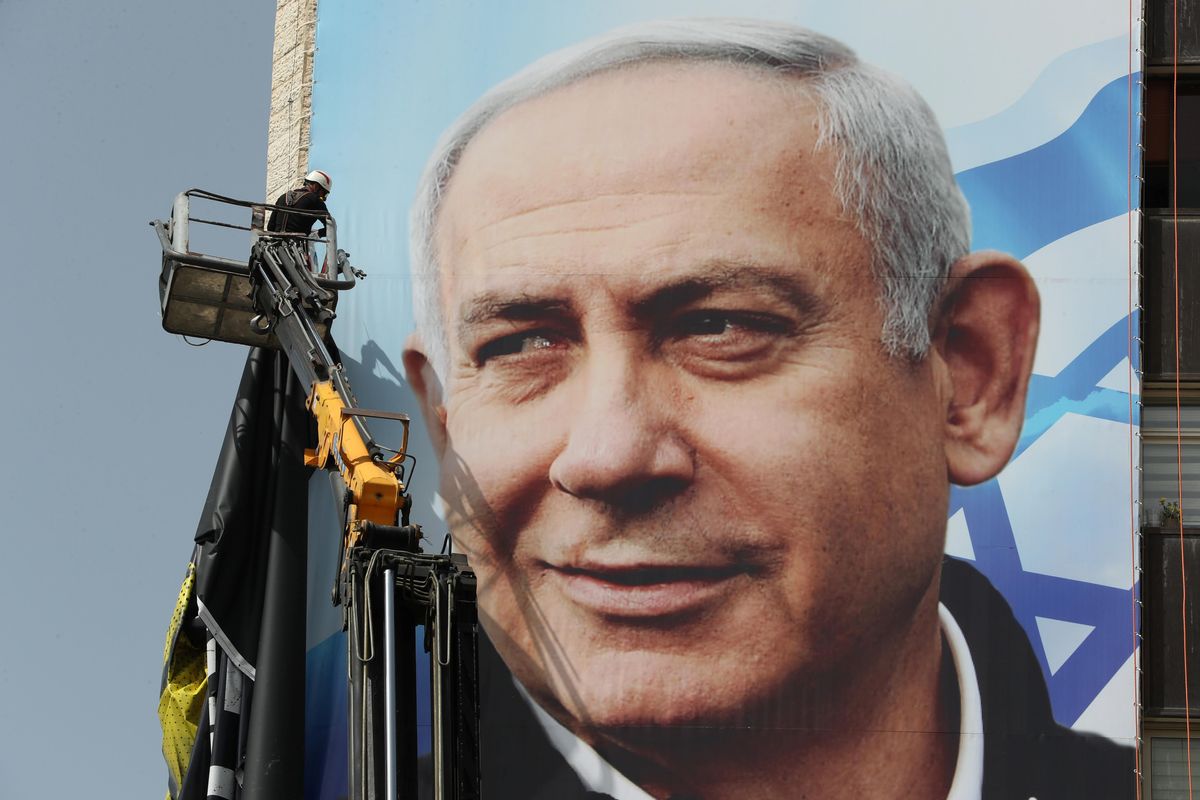Israel's merry-go-round politics are front and center again as Israelis are set to head to the polls on March 23 — the fourth time in two years. Billions of shekels later, will Israel's longest-serving Prime Minister Benjamin "Bibi" Netanyahu finally be shown the door?
While anything can happen in Israel's tumultuous politics, Bibi's downfall seems as likely as ever (though the race is tight) as his Likud party languishes in the polls. So what's changed, and what's the state of play as the campaign enters the homestretch?
Who are the key players?
One key difference this time around is that several longtime Netanyahu loyalists have defected from Likud, forming a new alliance on the right to oust their former boss.
The right-wing New Hope party, led by former Netanyahu ally Gideon Sa'ar, has attracted former Bibi allies, signaling a major blow for the loyalty-obsessed incumbent. At the same time, Bibi is having a hard time reverting to his old playbook of "left-shaming" because Sa'ar and his cohort have risen through the ranks of Bibi's own Likud camp, and their right-wing bonafides are well established.
In an electorate where a majority of Jewish Israelis identify as "right-wing," Netanyahu has to reinvent the wheel — a lot. However, while early political momentum seemed to be on Sa'ar's side, recent polls show his popularity waning, thus complicating his path to forming a viable coalition (though he could still sit in a coalition led by a different party).
For years, Benjamin Netanyahu has portrayed himself as Israel's elder statesman — the only leader who can aptly represent Israel on the international stage, and push back against global heavyweights to defend Israel's acute security needs. While polls still show his Likud party would likely win the most seats if elections were held today (29 out of 120), it's unclear whether he would be able to cobble together a coalition to clinch a 61-seat majority.
Moreover, Bibi's global leadership record resonates less with a struggling Israeli public that's been crippled by the economic aftershocks of the pandemic. Although Israel is beyond the darkest days when 800,000 people lost their jobs in mere weeks, and unemployment soared to a staggering 24 percent, economists say that the country's economic recovery will take a number of years.
Meanwhile, Yair Lapid of the centrist Yesh Atid party is gaining steam in the polls (he would pick up about 20 seats if the ballot was held today). Lapid — a former journalist who entered the political fray in 2012 focusing on social justice, economic inequality and reducing the outsized influence of the ultra-Orthodox in Israel's political life — has a simple message: bringing "sanity" back into Israeli politics. But opponents on the right say Lapid's lack of governing experience (he served only a brief stint as finance minister from 2013-2014) is disqualifying as the COVID crisis lingers.
Naftali Bennett, a former Netanyahu protégé, is shaping up to be "kingmaker." Both an anti-Bibi coalition as well as a Netanyahu-led bloc would need the support of his right-wing Yamina party (currently polling at 11 seats) to reach a majority in the Knesset, Israel's parliament.
What are some of the key issues?
Pandemic and economic revival. The Netanyahu campaign's main selling point is that the PM has overseen the world's speediest vaccine rollout, with 60 percent of the population having now received a jab (though he's been criticized for not providing enough vaccines to Palestinians in the occupied West Bank). Bibi is touting his strong record securing millions of doses of the coveted Pfizer-BioNTech vaccine before many other countries, which has resulted in European states like Denmark, Austria, Hungary and the Czech Republic now turning to Israel for help. But his political opponents are highlighting the country's economic stagnation, high unemployment rate, and mixed messaging on the pandemic that showed deference to Bibi's ultra-Orthodox political allies as signs that change is needed now more than ever.
Bibi's corruption trial, the judiciary, and democracy. The election campaign comes to a head as Bibi faces an ongoing corruption trial that could send him to prison. The PM says the courts have overreached, but critics argue that Bibi's desperate to stay at the helm so he can pass a retroactive law that would bar a sitting prime minister from facing trial. In their view, Netanyahu — and his supporters — have launched a vicious attack on the judiciary that's undermining Israel's separation of powers. If Netanyahu retains power, Lapid says, Israel will cease to be a democracy: "It's not a dictatorship, it's an in-between, a hybrid, anywhere between Hungary and Turkey."
Bottom line: With Israel's once-dominant left-wing camp in tatters, the upcoming political battle will take place solely on the right. Bibi has established himself as the perennial come-back kid, but this time it'll be much harder to use his old tricks against those who used to be on the inside.


















